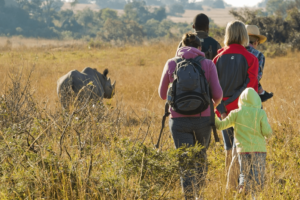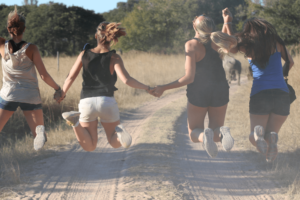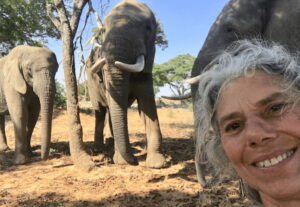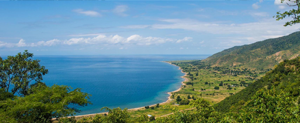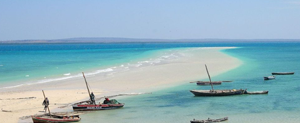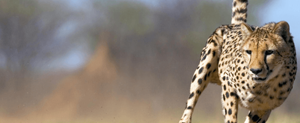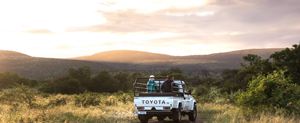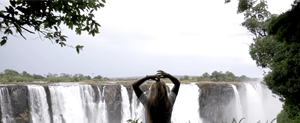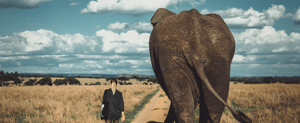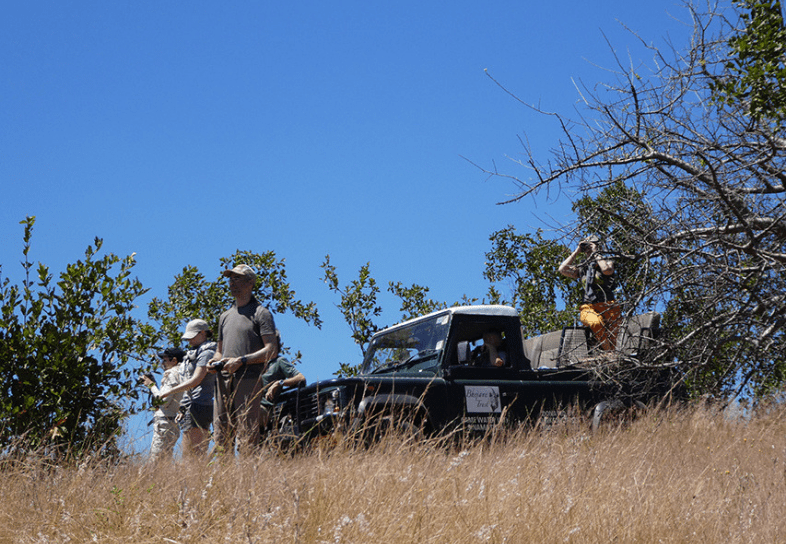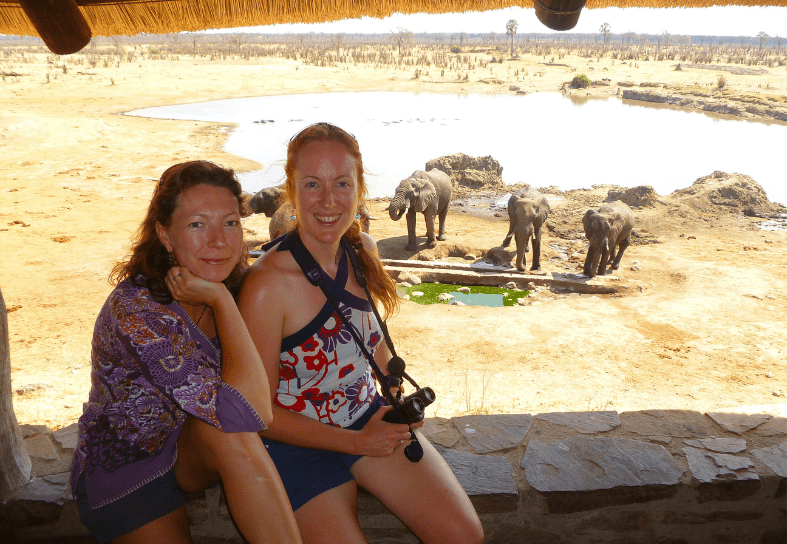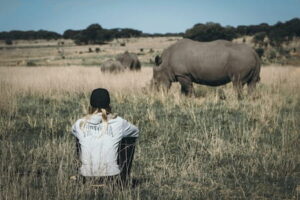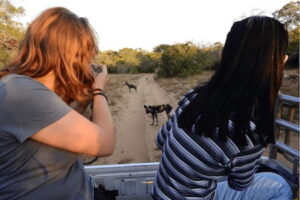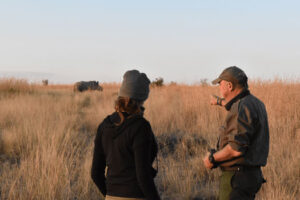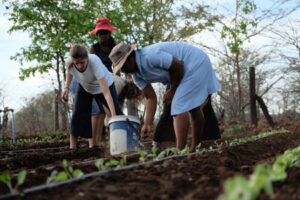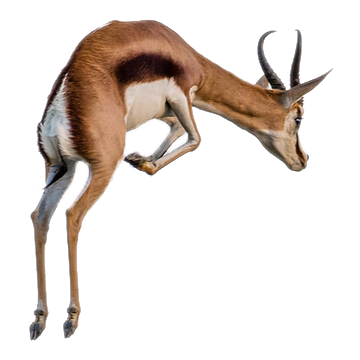Big 5 Wildlife Conservation
NATIONAL PARKS, VICTORIA FALLS, ZIMBABWE
Zimbabwe
2 weeks
Scheduled Saturdays
Up to 6 people
Age 18+
From $1,795
Zimbabwe
2 weeks
Saturdays
Saturdays
Up to 6 people
Max 6
Age 18+
From $1,795
What's the project about?
This Big 5 Wildlife Conservation Program is a true African experience. One where you will venture off the tourist trail and immerse yourself in Zimbabwe’s most remote and unspoilt wilderness areas. This is a chance to get a behind-the-scenes look at the hands-on conservation work carried out by staff who work every day to support the nation’s wildlife and wild areas.
This project is about supporting the long-term future of Zimbabwe’s wildlife.
The focus of the Big 5 Wildlife Conservation Program is to restore two of Zimbabwe’s most unspoilt and unexplored National Parks. The project team have also started work in a key conservation area which links these two National Parks together, creating an uninterrupted, continuous wildlife range. For the first time in decades, this offers animals safe passage between each area.
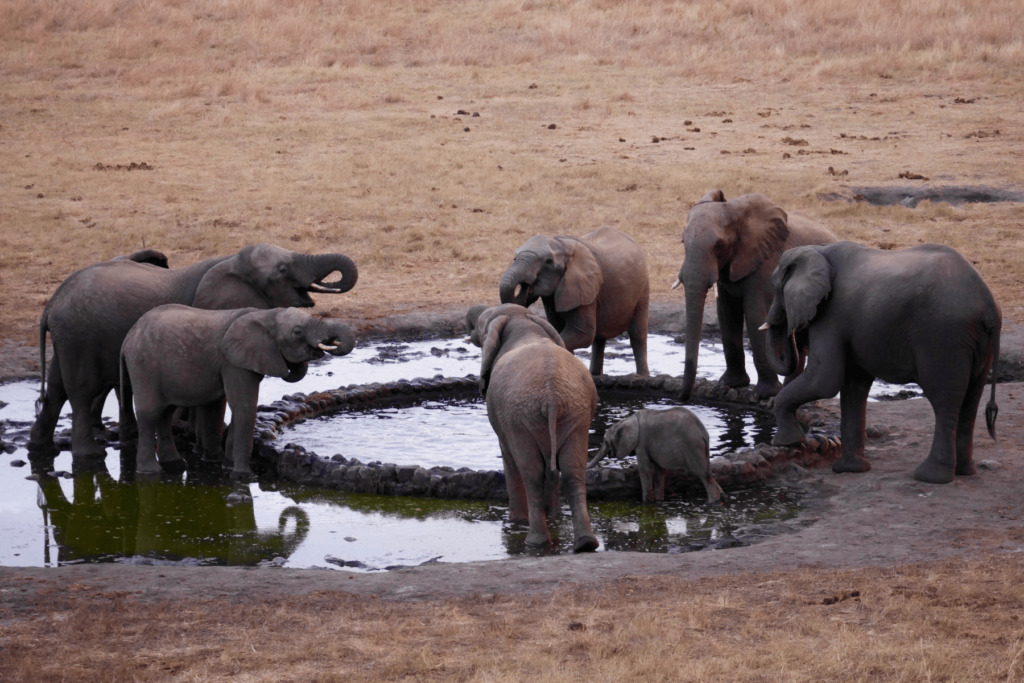
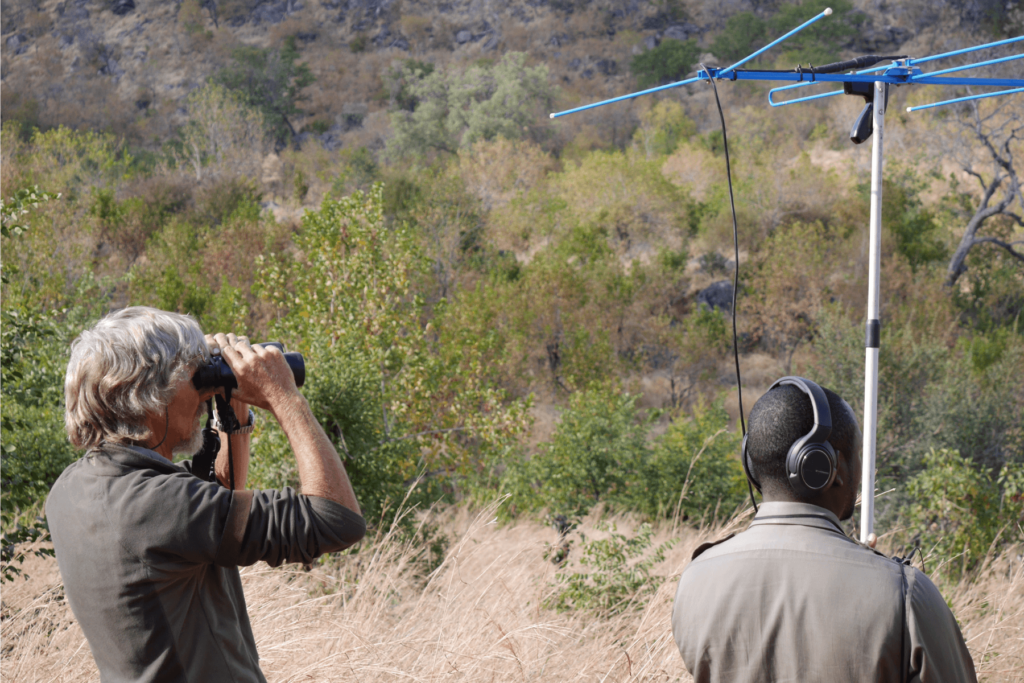
How will I be contributing?
This is a unique opportunity to volunteer as a Field Assistant, supporting the daily operations of the project staff. Wildlife volunteers will support project staff, work with Parks rangers and get involved in the ongoing operations of running a huge conservation area.
Volunteers gain a unique insight into the reality of the daily challenges facing conservationists who are dedicated to Africa’s most vulnerable wildlife. You will participate in wildlife monitoring of elephants, lions and giraffes; work on research projects studying African wild dogs and cheetahs; undertake bird and animal population surveys and assist with ranger field support. Learn about the work being done to sustain Zimbabwe’s wildlife and natural environment, and the challenges facing conservationists working to support animals in vast National Parks.
What makes this project ethical?
The Big 5 Conservation volunteer programme has been established for more than 15 years – as long as the Trust has been operating. It allows wildlife enthusiasts to join the team, and enjoy a rare and exciting opportunity to experience the Africa of conservationists, and its vast, remote wilderness. At the same time, you are actively assisting in the conservation and survival of iconic African wildlife.
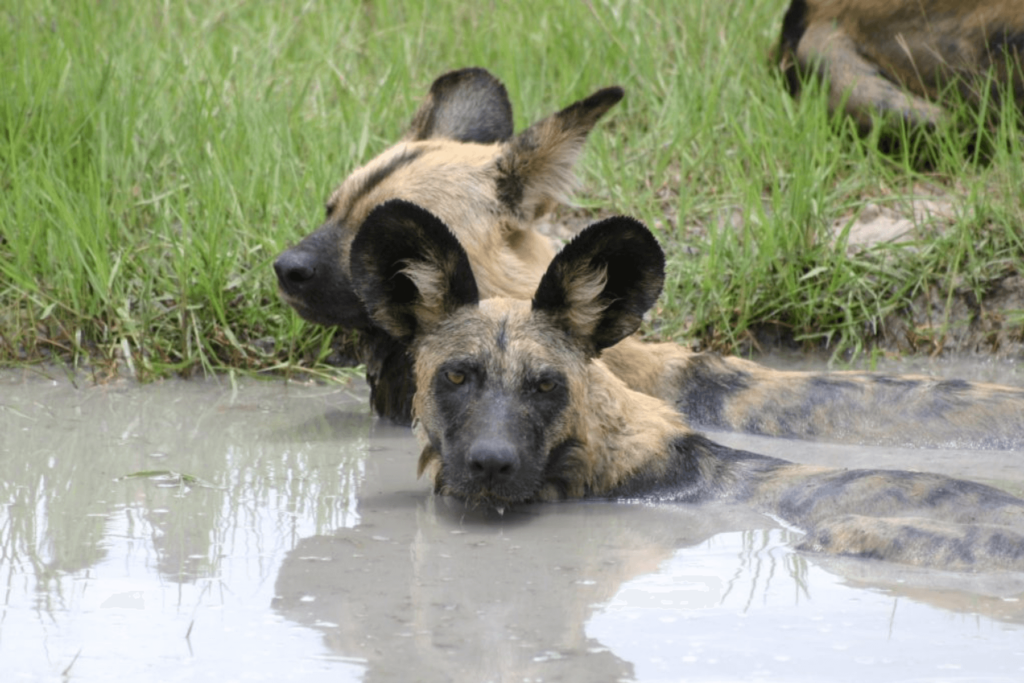
Project showreel
Project gallery
Project information
Join a team of dedicated conservationists, monitor big game including elephants, wild dogs and lions, and assist with vital projects within two of Zimbabwe’s most remote and unexplored National Parks. The Big 5 Wildlife Conservation Program is a unique opportunity for volunteers who are looking for a true wilderness experience, and who want an understanding of how a National Park works.
Highlights:
- Watch huge elephant herds gather around waterholes.
- Observe Africa’s most iconic wildlife and monitor their movements and territories.
- Experience some of Africa’s most remote and unspoilt wilderness areas and know that you are contributing to their conservation.
- Work on vital restoration projects including maintenance of water points, roads and riverbanks.
- Camp out under the night skies in this off-the-beaten-track adventure.
The Big 5 Conservation Programme works around the full moon, as this time and the period just after, is when animals like lions tend to be most active.
Your activities and itinerary will depend on the time of year you join the project, but there is plenty to do year-round and your work will always be useful, exciting and very interesting.
Wildlife Conservation activities:
Your primary role on the Big 5 Conservation Program is that of a Field Assistant. In each Park and wildlife area, volunteers monitor animal movements, record the location of specific animals and herds, and look at the structure of known groups of elephants. North Western Zimbabwe has a one of Africa’s largest elephant populations (around 100,000) which can be very destructive in their constant search for food and water.
As you move from location to location, the activities and duties will vary depending on the ecosystem and its needs. Volunteers may get involved with:
- Research into predator populations including the endangered African Wild Dog and Cheetah.
- Monitor elephant movements and the location and composition of specific herds.
- 24 hour full moon game counts – one of the highlights of the project!
- Night drive predator surveys.
- Foot patrols and spoor tracking.
- Monitoring animal movements and looking at the impact of certain animals in the area.
- Big game monitoring and identification
- Large animal and bird population surveys
- Population monitoring of African wild dog
- Learn about birds, butterflies, trees and grasses and how they impact the health of the Parks
- Set up and monitor camera traps, looking at animal activities around popular animal paths.
- Record snaring and poaching incidents.
- Vulture nest monitoring.
Park maintenance and development:
In addition to being a field assistant, volunteers participate in several other programs, including infrastructure maintenance, especially of each Parks’ water points. The water points are vital for the survival of all animals during the long dry season. NGOs and private individuals have supported the introduction of pumps at many water points, but these are regularly damaged by elephants and suffer general wear and tear from lots of pumping. Depending on the time of year and location, volunteers may get involved with:
- Repairing elephant damage to pumps around water holes
- Repairs and installing of solar and wind pumps
- Digging out water points
- Building and maintaining new game viewing hides next to waterholes.
Game Park Management:
- Carry out repairs and maintenance to Park infrastructure such as game viewing hides and road signs.
- Create new roads and repair river erosion.
- Carry out environmental management and area rehabilitation such as digging trenches, tree planting and invasive species removal.
Days can be incredibly varied, as is life out in the bush. One minute you may be conducting a road repair exercise when you come across a fresh lion kill. The whole day’s plan will often go out the window as you grab the opportunity to marvel at one of nature’s most stunning experiences
The activities can include long hours and early starts, but it is a rewarding and enriching experience, like no other. You will only do necessary work, be it covering long distances, repairing water points, snare patrols or game counts, but it is essential that the work is done.
Your base on this project is in the Woodlands Conservancy, where you will stay in a permanent tented camp. In general, you will do your work in the Kazuma Pan and Zambezi National Parks on a day trip and 1-2 night excursion basis.
Your home at Woodlands is a tented camp with comfortable dome tents and a separate shared ablution block. Built atop a ridge with incredible views of bush, and overlooking a waterhole frequented by abundant wildlife. Rooms are twin tents with beds and mattresses. All linen, bedding and blankets are provided. We do request that you bring a sleeping bag and mosquito net for added comfort. Each tent has its own lighting and power points to charge phones and cameras. The camp has basic shared bathroom facilities with hot and cold water showers and flush toilets. There is solar power and good 3G signal within the camp area and there is a central dining and living area. We recommend purchasing a local Econet SIM card at the airport when you arrive. There is no access to WiFi.
Meals are provided in both locations, with volunteers helping to cook, often over an open fire. Meals are wholesome and home-cooked and vegetarians can be provided for. Please let us know if you have other more specific dietary requirements. The camp is fairly remote so you may be asked to bring specialist food items such as gluten-free pasta or bread flour with you. Volunteers assist camp staff with food and general clearing up.
There will be weekly opportunities to accompany project staff in the resupply vehicle into Victoria Falls town, either to explore or to stock up on items of a personal nature. There may be an opportunity to visit an internet cafe to use the WiFi.
On the final Friday of the two-week programme, you will be transferred back to Victoria Falls where you will have time to explore the Falls themselves and participate in some of the thrilling adrenalin activities the town has to offer. Bungee off Victoria Falls bridge, enjoy some of the best rafting in the world on the Zambezi River, enjoy a sunset river cruise, or take High Tea on the spectacular verandah at the Victoria Falls hotel. Lodge accommodation on a B&B basis for that night is included in your programme fee.
Victoria Falls is also the gateway to Chobe National Park in Botswana, and most operators offer day trips to this magnificent National Park, which allows you to tick another country off your bucket list!
“The hosts are amazing. They took care of us volunteers, with so much passion and love and I felt so very welcome from the start! I slept in a cabin where I had my own room with an amazing view. It was perfect! The food was made with love and care. I am allergic to pork and they already knew so I didn’t have to ask once if I could eat everything. Every meal has been amazing, home made and the taste… aahh! There was another volunteer who was gluten intolerant and that can be a real challenge. But Stephen and Su did everything they could to help Peter out. They were absolutely amazing!”
When can I volunteer?
The project is closed between November and April, as heavy rains make roads impassable, and campsites can be soggy. However, if you would like to volunteer on this project outside of the dates below, please enquire and we will see if there are any opportunities available for you to shadow the project staff. This is also an amazing experience, where you will really see what day-to-day life is like as a conservationist in Africa.
Project Pricing:
2 weeks: $1,795
All prices are in USD.
2024 project dates:
11th – 25th May (1 space available)
15th – 29th June
13th – 27th July
10th – 24th August
7th – 21st September
12th – 26th October (this is a special programme where in addition to the normal work, you will spend a long weekend participating in the annual WEZ mammal census, which is a fantastic and unique experience).
What’s included in the cost?
- Project contribution: this goes directly to our project partner and provides funding to ensure the programme can continue to meet its goals. For this project it will cover things like staff costs, equipment purchases, maintenance of pumps, equipment and vehicles, purchase of materials for building projects etc
- Accommodation and three meals per day
- Return transfers from Victoria Falls (airport or town)
- Comprehensive orientation and supervision
- Training, equipment and materials required to do your work
What’s not included?
- Flights or travel to Victoria Falls, Zimbabwe
- Visa fees
- Travel insurance (compulsory)
- Personal expenses such as souvenirs, drinks, snacks and activities in Victoria Falls
- Pre and/or post programme accommodation
- Additional excursions
- Local SIM card and data/airtime bundles (optional)
- Administration fee ($40)
View our booking terms and conditions.
Volunteers live within the unfenced Woodlands Community Conservancy, bordered in the north by the Kazuma National Park, and in the South by the Zambezi National Park.
Days can be incredibly varied, as is life out in the bush. One minute you may be conducting a road repair exercise when you come across a fresh lion kill. The whole day’s plan will often go out the window as we grab the opportunity to marvel at one of nature’s most stunning experiences.
Your typical day starts with breakfast at camp overlooking the waterhole, observing the animals begin their daily routine in the bush. Mornings are usually spent conducting any number of wildlife activities. This may include a walking spoor transect, driven Bird and Mammal counts or management activities such as waterhole repairs and maintenance or invasive plant removal.
The hotter parts of the day are usually spent in the shade of camp doing tasks such as camera trap photo analysis or data entry. These are also good opportunities to immerse yourself in the knowledge of our project leaders as they share insights into the conservation efforts they undertake, or simply add to the insect and bird checklists as these animals flock to water to cool off in the mid-day sun.
After lunch, you will find yourself back in the bush, either on foot or in a vehicle to continue the various wildlife monitoring or reserve management activities.
After a long day, your evening finishes off around the camp fire, taking in the world-renowned African sunset, casting your eyes to the waterhole hoping to catch a glimpse of the nocturnal animals waking up and starting their evening’s activities.
Some evenings will find you back in the vehicle after dinner armed with a spotlight as we embark on a predator survey. Most predators are nocturnal, and as such we need to be out at night to better understand their dynamics
and behavior.
Some days will find you heading out early into either of the National Parks, armed with a GPS, data sheets and packed food, you will spend the day conducting various monitoring and management activities within the parks.
One of the highlights is the full moon 24 hour game count. We aim to do these monthly, over the full moon period. This finds our volunteers stationary at a pre-selected water point and counting each and every animal that comes to drink.
Days in the bush can vary incredibly, and it’s not uncommon for plans to change at the drop of a hat as we go about our normal activities. This requires someone to be extremely flexible and prepared to change focus as and when required.
One thing we can assure you, is that at the end of the day, be it back at camp or out in the National Park camping under the stars, you will fall asleep after a rewarding days work to the sounds of the African night.
Who should volunteer on this project?
No wildlife experience is necessary, but a passion for the outdoors, an adventurous spirit and a willingness to work hard and part of team, are absolutely required. The project is about benefiting the wildlife in Zimbabwe and learning about how the project works for the conservation of Zimbabwe’s wildlife.
You should be able to communicate reasonably well in spoken English.
How fit do I need to be?
Good health, a moderate level of fitness and all-round good mobility will make your time more comfortable. The physical work that is done on the project is not heavy manual labour, so volunteers of all ages are welcome!
How old do I need to be?
The minimum volunteering age for solo travellers is 18 years. There is no upper age limit subject to the health and mobility requirements above.
How many people will there be?
There is a maximum of 6 volunteers at one time, plus staff.
When can I join?
Projects begin on a Saturday, so you should either arrive into Victoria Falls no later than 1300 on your project start date, or plan to overnight in town the night before. You will be collected either from the airport or from your lodgings.
When is the best time to come?
During the summer (October – March) temperatures in the Victoria Falls area average 30°C and can often reach over 35°C. A light waterproof jacket is also essential for sudden downpours! Average lows are around 17-20°C. Game viewing is at its best during the dry winter months, and if you can bear the heat, September and October are prime months, when the bush has thinned out and animals make their way to waterholes to find food and drink.
During winter (April – August) daytime temperatures average 25-27°C with no rainfall at all. Temperatures during the night and in the mornings and evenings regularly go around 10°C, so lots of layers are needed!
How long can I volunteer for?
Projects run for two weeks every month.
Do I get some time off?
There is a weekly provisioning trip into Victoria Falls which volunteers are welcome to join. Here you will have the opportunity to explore, stock up on snacks or visit an internet cafe. Your final Friday is also a leisure day in Victoria Falls, so it is usually easier to leave souvenir shopping until the last day.
How do I stay in touch?
There is 3G signal at Woodlands base camp. We recommend purchasing an Econet or NetOne SIM card on arrival into Zimbabwe and a data bundle. Make sure your phone is unlocked before you leave home. There is limited or no cellphone signal in the Zambezi and Kazuma Pan National Parks so it’s best to assume you will be out of contact for those days. There is no WiFi on the project except via internet cafes on resupply days in Victoria Falls.
How much spending money should I bring?
We recommend bringing around $100 a week in local currency to cover personal expenses such as drinks, souvenirs, snacks, tips and internet usage. Please bring USD cash and have access to a Visa card.
Do I need a visa?
Most nationalities, including British, American, Canadian, Australian and most EU citizens, can get a 30-day tourist visa upon arrival into Victoria Falls. Fees are dependent on nationality and range from $30 – $75 (paid in USD cash). You must request a tourist visa.
It is your responsibility to check your visa eligibility prior to arrival.
What animals will I encounter?
It is fairly likely that you will have significant sightings of elephants, lions, buffalo, hippo, African wild dogs on your stay. Cheetahs are also regularly seen. You will also experience plains game such as giraffe, wildebeest and zebra and more interesting and rare antelope species such as Roan, Tsessebe and Sable. The birdlife around the pans is prolific.
What vaccinations do I need?
Please consult your GP or travel clinic for detailed medical advice. All volunteers should make sure their Tetanus is up to date.
Malaria – the project is regarded as a medium-high risk malaria area, but please consult your GP for guidance.
Please visit this UK government website for more details.
Project goals
- The ongoing preservation of game water points, including the installation and maintenance of permanent water pumps, in the main to sustain and manage immense elephant herds through the dry season. A good network of water points over a wide area, will enable Park managers to turn off pumps in rotation, forcing elephants to move and giving the vegetation time to recover;
- The successful protection of wildlife through the deployment of anti-poaching teams and the provision of food and equipment;
- Environmental monitoring in conjunction with the Parks ecologist, monitoring wildlife populations through road transect surveys, water point game counts, giraffe and vulture surveys and bird atlassing;
- Tourism infrastructure development, including refurbishing hides and picnic sites, installing new signs and fixing roads.
In the Zambezi and Kazuma Pan National Parks, the project will continue to concentrate on restoring the area, encouraging wildlife to return, and focusing on significant anti-poaching efforts. Volunteers are instrumental in their ongoing research projects:
- Wildlife research into sable antelope, hippo, small carnivores, and the seasonal movements of buffalo and elephant;
- Vulture and raptor surveys to assess their status and protection requirements;
- Compilation of a bird atlas for the area.
Volunteers are instrumental to the project achieving their goals.
Project background
The project was established in 2010, initially to monitor the last remaining population of black rhinos in Hwange National Park. The team found they were providing increasing assistance to National Parks in many facets of their operations, including anti-poaching ranger deployment, fixing and installing water pumps, helping maintain tourist camp sites and assisting with research projects. Their operations were extended to the Zambezi National Park, close to Victoria Falls, where they have been instrumental in reviving one entire section of the Park through the provision and maintenance of boreholes and water pumps, the restoration of natural pans (seasonal water holes), road development and game monitoring.
Volunteering in the Zambezi National Park, Victoria Falls
This park is situated on the edge of Victoria Falls on the western tip of Zimbabwe. A huge variety of animals are found within the Zambezi National Park, including four of Africa’s Big 5 game (there are no rhinos). The Trusts work in ZNP began with the restoration of the Chamabonda vlei area, where they have repaired old boreholes, installed new ones and helped revitalise the whole area through the new provision of water for animals who had long since abandoned the park. The return of animal populations is a major success story of the Trust’s activities in the park. You will enjoy amazing sitings and get off the beaten track, as you camp and help restore this pristine wilderness area.
Volunteering in the Kazuma Pan National Park
In 2023 the Trust expanded its operations into the Kazuma Pan National Park, a 15,000-hectare conservation area home to four of the Big 5 (there are no rhinos), plus cheetahs and African wild dogs. The work here also focuses on water security, environmental restoration, anti-poaching and wildlife monitoring.
Woodlands Community Conservancy
In 2024 the Trust began operations at Woodlands Community Conservancy, which borders both the Kazuma Pan and Zambezi National Parks. The management of Woodlands has begun the process of creating an uninterrupted, continuous wildlife range. For the first time in decades animals can have safe passage between each area, increasing their usable land space. The project is starting from scratch in Woodlands to create and maintain this safe wildlife corridor – reduce poaching, stop illegal hunting and better manage the land.
The Woodlands Conservancy and Kazuma Pan National Park both require significant work in order that they serve their purpose of being safe havens for wildlife.
The support given by the Trust is invaluable for the continued survival of these wilderness areas and the animals which live and pass through them.
Volunteer reviews
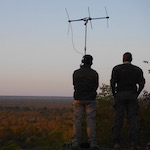
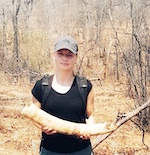

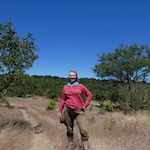
Other projects you might be interested in
Join a unique conservation programme, dedicated to the protection of the black rhino. Play a vital role in securing the future of these iconic animals.
From $950
1 - 12 weeks
Support conservation work to protect endangered species in South Africa. Monitor priority species including lion, leopard, cheetah, rhino and wild dog.
From $1,625
2 - 16 weeks
Gain practical experience in advanced anti-poaching techniques, learning from South Africa’s most experienced conservation professionals.
From $1,395
7, 10. 14 days
Volunteer in Victoria Falls and support grass-roots community action. Build strong communities through livelihood development and education projects.
From $850
1 - 12 weeks

